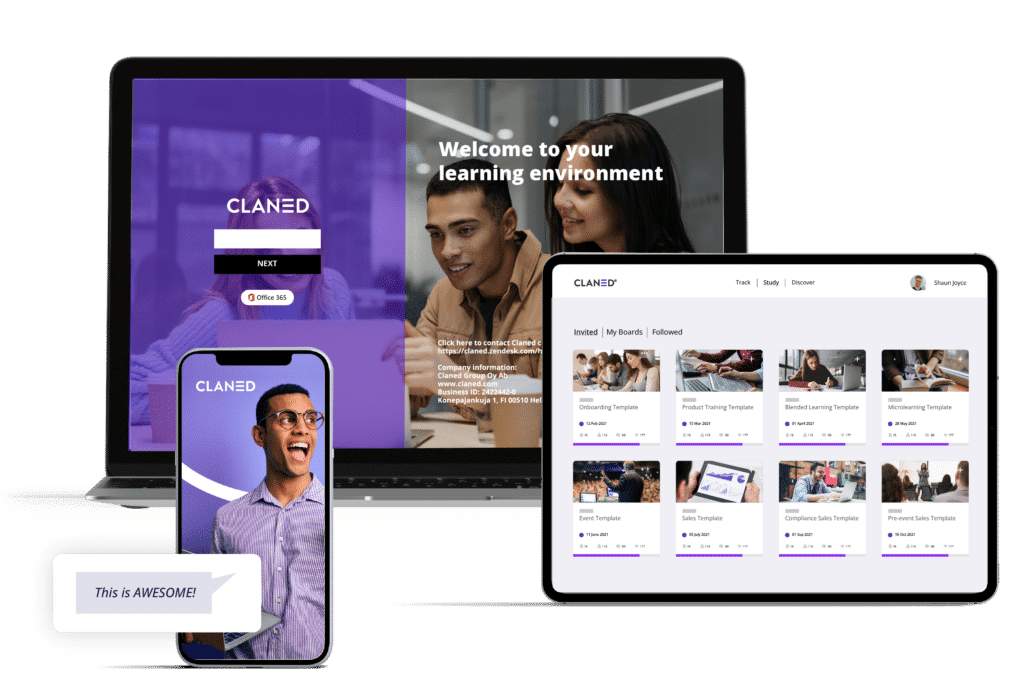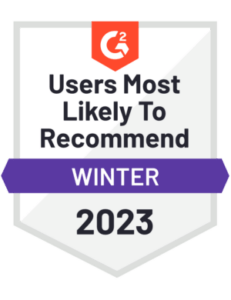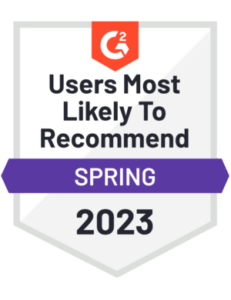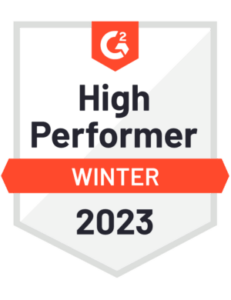So you go looking for the perfect online learning platform for your new training or learning program. But before you know it, you’re suddenly introduced to the two big acronyms that rule the topic – LMS and LXP. Before you can catch a breath to figure out what they stand for, you’re swished away to the middle of a raging, passionate debate about which of them is superior.
And all you were looking for is a learning platform!
When it comes to making the choice of learning platforms, the online learning industry has plenty of opinions. And for good reason.
In an increasingly competitive world, it’s no longer enough to execute online trainings on the ‘default’ online learning platform and call it a day. Organisations are more eager than ever to keep up with the evolution of online learning, and the changing trends in learning platforms are a huge part of that evolution.
The choice is indeed an important one. It’s probably also why you went looking for the ‘perfect online learning platform’ in the first place.
But with all that said, the journey to finding the right learning platform for you doesn’t have to be confusing, or overwhelming. Allow us to take you on a little trip to the fascinating world of LMS and LXP. We’ll cover both their benefits and differences, and finally help you decide which one is the right choice for you and your learning program!
Sounds good? Let’s go!
What is an LMS? Learning Management System
Let’s kick things off with the LMS.
The acronym LMS stands for Learning Management System. In its basic, simplest form, an LMS is a platform that can be used to administer, track, report and deliver online learning to participants. But the significance of an LMS often goes beyond this basic definition.
In the world of online learning, there’s usually a good chance that when people say ‘learning platform’ what they really mean is an ‘LMS’. That’s how ubiquitous this type of learning system is – and indeed has been for a long time. Although the first open-source LMS only came into existence in the year 2000, the concept of an LMS has been around since the late 1920s.
Of course, the LMS has come a long way since its early rudimentary beginnings. Modern LMSs offer various technological capabilities and are now widely used to execute online trainings and blended learning programs.
The LMS platform offers participants a set pathway of curated and controlled content with an administrator often overseeing various parts of the learning program. Guidelines are put in place to determine the type of content that can be uploaded, viewed or accessed by the learner. The content and learner performances are also monitored and tracked by the administrator to ensure that the learning experience is carried out in the way that it was intended.
The popularity of LMS has endured over the years and continues to be proven every year with new organisational surveys. According to the 2021 Training Industry Report, as many as 90% of the surveyed companies reported using an LMS to meet their training needs. So the LMS isn’t disappearing into the ether anytime soon.
READ: 10 Best LMS For Corporate Training
And yet, debates about whether the LMS is truly future-proof can be commonly found within the e-learning industry. The question often looms large: is the era of LMS coming to a close? Is it on its way to becoming redundant? Has it become redundant already?
What is an LXP? Learning Experience Platform
One of the reasons why concerns about the LMS’ future abound is that a more recent alternative has already made its presence known in the online learning market. This is the LXP, which stands for Learning Experience Platform.
The name is pretty self-explanatory, in that the LXP is a type of learning platform that focuses largely on the learner experience. Unlike the LMS which offers a set pathway of curated content, the LXP offers autonomy to learners and allows them to choose their own learning by offering a variety of personalised content.
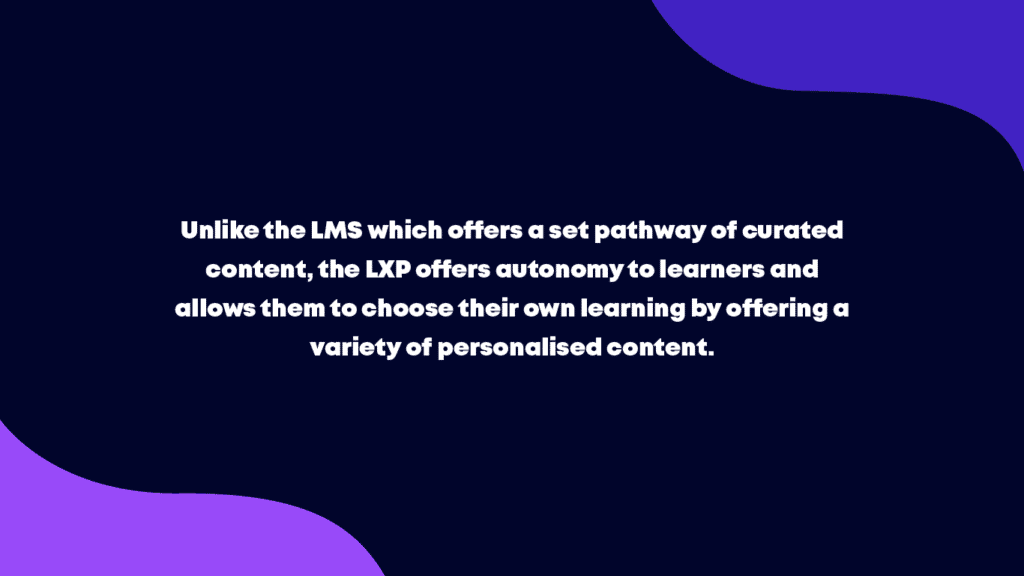
Because user experience is at the core of an LXP, the learning provided on the system is often far more flexible than on traditional learning platforms. Whereas the LMS focuses more on formal learning, LXPs claim to take other aspects of learning into account, such as informal, social and collaborative learning.
READ: What is a Learning Experience Platform (LXP) (The Ultimate Guide)
Another feature that sets the LXP apart is that it allows learners to access diverse forms of content from external sources and promotes user-generated content and peer discussions within the learning program. The goal of an LXP is to offer an overall personalised learning experience for each user, leading to high engagement and therefore, improved learning outcomes.
LXPs are often touted to be the ‘future of learning and viewed as the next step in the evolution of learning technology. But with all that said, the world of online learning has still been slow on the uptake with the LXP.
A 2020 Report on Learner Experience, Engagement, and Solutions found that only 11% of surveyed companies had opted for an LXP. Meanwhile, a number of organisations still view LMS as their ‘fundamental’ learning platform upon which they could further build capabilities.
Now, if you’re someone looking to make that crucial choice between the two, all of this information might only be making your choice all the more difficult! The LMS appears to be a solid, straightforward learning platform, while the LXP is deemed the future of learning technology. And yet, organisations are reluctant to take that next step in switching systems, and there must be a good reason for that, too.
So to help you make this important distinction, we think it’s time to explore the differences between the two – and their unique benefits – in more detail!
READ: Claned’s Glossary of Online Learning Jargon
What’s the Difference Between an LXP and an LMS?
The main difference between LXP and LMS is that LXPs prioritize personalized, adaptable learning experiences, while LMSs offer structured, often formal training approaches.
While we’ve covered the difference between LMS and LXP in definitions and broad strokes, it’s time to get into the specifics of exactly what sets the two apart. Here are five important points that we think highlight the major differences:
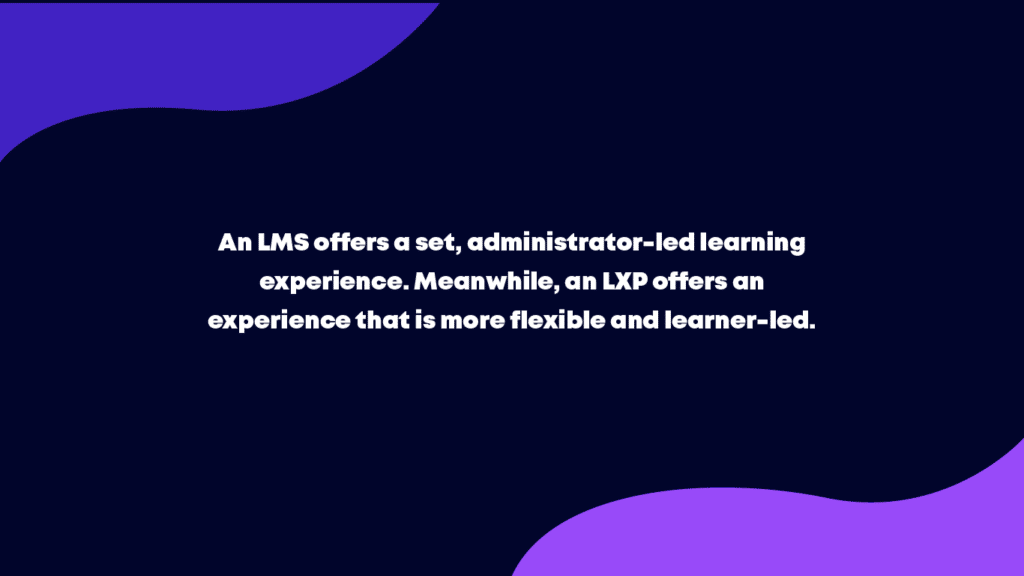
Experience
The fact that the ‘X’ in LXP stands for ‘experience’ tells you a lot about the focus of this type of learning platform. LXPs are all about creating the ideal, learner-led, personalised learning experience.
As a result, they are easier for searching and navigating content than traditional learning platforms. Think Netflix, Spotify or other content recommendation platforms that take user interests into account and display options based on previous choices and feedback. The learning experience moulds itself around the individual learner.
In comparison, an LMS experience is oriented toward offering a rigid, pre-planned course content. The goal is to offer a standard and structured order of content and activities with little to no room for deviation. Content is regulated, interactions are monitored, and performance is duly tracked. In situations that prioritise formal learning, this is often the bare minimum experience required for both learners and the organisation.
Control
An LMS is traditionally ‘top-down’ controlled. This means that tasks such as the creation and curation of the program are handled by an individual or team, typically from the HR or L&D department. So are tasks such as controlling access, monitoring interactions and tracking the progress and performance of the learners.
By contrast, LXPs follow more of a bottom-up approach. The learners themselves have more of a voice and are free to interact with the content and each other as they see fit. They can engage with the vast array of content on offer, and even create their own content to be shared with peers. Learners have the freedom to seek out the parts of the learning experience that they find most relevant, even if it means engaging in informal learning or seeking out external sources of information.
Type of Learning
LMSs represent a ‘push’ approach towards learning. The learning experience is directed at the learner as opposed to attracting them towards it.
As we mentioned before, LMSs are better suited for formal types of learning and training, typically compliance trainings, product trainings or certifications. The learning is typically restricted by guidelines set by the organisation and is more prescriptive in nature.
The typical learning journey on an LMS sees learners perusing the content materials and completing assessments at set timelines enforced by the LMS. The learning is focused on acquiring a specific set of skills or knowledge rather than developing an organisational culture of learning.
On the other hand, LXPs are more suited for learning programs that aim to promote continuous learning or personal development skills. The learning is more flexible and open-ended in order to allow learners to have more of a say in the learning process. This is the ‘pull’ approach to learning, whereby learners are encouraged to participate and engage in their own learning.
Content
It isn’t possible to make a broad generalisation about the types of content featured in both learning platforms. But for the most part, these are the trends you would typically see.
Traditional LMSs tend to rely heavily on SCORM (Shareable Content Object Reference Model) content as it provides more rigidity in structure. Keep in mind that with SCORM comes a set group of protocols and principles that determines what content can and cannot be featured on the LMS. Most content is long, offered in traditional content formats, and follows a predetermined course.
Compare that to LXPs which, thanks to xAPI, can host and include a wide variety of content, tools and resources within the learning program. Because the focus is on experience, any content format that enhances that experience can be integrated (and opted by the learner) such as videos, webinars, VR and much more.
Use of Data
It is nearly impossible to discuss online learning or learning platforms anymore without considering the essential matter of learning data. Learning data, and what learning platforms are able to accomplish with it, have now become the key to building a successful, well-informed learning strategy. So how do our learning platforms fare in that department?
With LMSs, the data is generally used to track and manage learners and learner performance. The insights from the learning data are limited to finding out how many people have completed the content or passed assessments and showcasing their results. LMSs might also measure drop-off rates, track performance and match individual employees with the type of regulatory training they need.
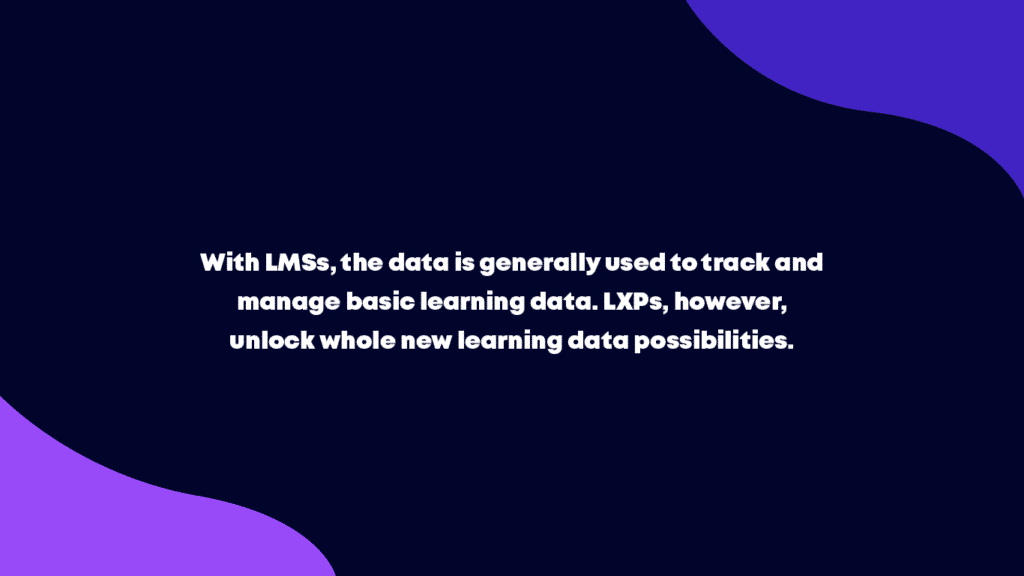
LXPs, however, unlock whole new learning data possibilities. Because LXPs offer a wide variety of personalised learning pathways to learners, they also offer different insights into learning behaviours and learning styles. They might be able to identify topics of interest, difficulty levels of modules, and offer a larger picture of what keeps learners engaged (or doesn’t).
READ: 7 Questions to Ask Yourself Before Building an Online Course
LXP vs LMS: What Should You Choose?
Now for the big question that organisations like yours are grappling with: which is it? LMS or LXP? And as is always the case when you’re offered excellent options, the answer is not a simple one.
The most truthful answer to the ‘LMS or LXP’ question is: whichever one suits your organisation’s specific needs or requirements best!
One simplistic conclusion for this comparison might be that LMS is more ‘old school’ while the LXP is more ‘new school’, but there is more than meets the eye. The truth is that elements of both types of learning systems are usually required for organisational learning initiatives.
Organisations are always in need of the structure and order that LMSs provide, which is precisely why they have stood the test of time. But as technologies evolve and learning trends move towards empowering learners, organisations also need the freedom, flexibility and technological capabilities that LXPs stand for.
It’s a good thing then, that some learning platforms in the market make the LMS vs LXP choice easier – simply by not making you choose in the first place!
READ: How to Choose a Learning Platform
FAQ About LXP and LMS
LMS and LXP are the two most popular types of learning platforms in the e-learning market. Picking the right platform can do wonders for the success and results of your learning programs.
Depends on your requirements. Do you only carry out formal trainings? If not, you might want to look into switching to a modern option that offers more features, insights and capabilities!
Not really. With a platform like Claned, your organisation gets to enjoy the best of both worlds. Reach out to us at sales@claned.com and we’d love to tell you how!
LMS, Meet LXP: Best of Both Worlds at Claned
At Claned, we are always looking to design, implement and measure online learning in ways it’s never been done before. Our goal is to identify what’s missing in traditional and modern online learning platforms and to not only fill the gaps but discover new brand-new approaches to learning that keep both learners and organisations happy.
That’s why our online learning platform is a perfected blend of what works best for your learning needs, instead of sticking true to the definitions of LMS and LXP.
On one hand, we offer organisations the order, structure and control they seek with their learning programs – much like an LMS. Claned covers all the basic functionalities of an LMS, offering everything a standard LMS could provide including formal training, delivery and tracking.
But it also goes beyond the traditional learning experience and offers so much more – in the true spirit of an LXP. It creates a learning experience that learners can excitedly explore and engage with, offering a variety of content and personalised recommendations. It also supports user-generated content and content sharing among peers, thereby promoting social and collaborative learning.
Meanwhile, it offers organisations deep insights into their training programs with the help of our intelligent data analytics, real-time tracking and insightful data reports. All of these features combined offer a wide range of detailed perspectives into learning and course success that are unheard of in traditional LMSs.
More than just delivering learning, Claned is all about finding the best route to learning success for organisations while offering an engaging experience for learners. Truly the best of both worlds. No choice needed!
Ready to see what a best-of-both-worlds learning platform could achieve for your organisation?
Book a demo with us at sales@claned.com!


